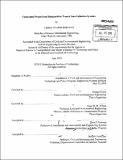| dc.contributor.advisor | George Kocur and Nigel H. M. Wilson. | en_US |
| dc.contributor.author | Brakewood, Candace Elizabeth | en_US |
| dc.contributor.other | Massachusetts Institute of Technology. Technology and Policy Program. | en_US |
| dc.date.accessioned | 2011-01-26T14:25:55Z | |
| dc.date.available | 2011-01-26T14:25:55Z | |
| dc.date.copyright | 2010 | en_US |
| dc.date.issued | 2010 | en_US |
| dc.identifier.uri | http://hdl.handle.net/1721.1/60796 | |
| dc.description | Thesis (S.M. in Transportation)--Massachusetts Institute of Technology, Dept. of Civil and Environmental Engineering; and, (S.M. in Technology and Policy)--Massachusetts Institute of Technology, Engineering Systems Division, Technology and Policy Program, 2010. | en_US |
| dc.description | Cataloged from PDF version of thesis. | en_US |
| dc.description | Includes bibliographical references (p. 108-113). | en_US |
| dc.description.abstract | Many public transit agencies are considering direct acceptance of contactless credit and debit cards (collectively contactless bankcards) at gates in rail stations and on board buses. Concerns have been raised about riders who may not have or may not want to use contactless bankcards for transit fare payments. This thesis presents contactless prepaid cards as a potential fare payment option to meet the needs of these riders, and assesses customer attitudes toward contactless prepaid cards and bankcards. Two case studies are presented of transit agencies planning to implement contactless bankcard fare collection systems: Transport for London and the Chicago Transit Authority. A framework for evaluation of transit prepaid card options addresses two independent policy decisions: card function, or how the prepaid card may be used, and program management, the companies that partner with transit agencies to provide prepaid cards. The two card function options are: open loop cards, accepted at any merchant, or closed loop cards, used only for transit. Five possible program management options are addressed: the transit agency, bill payment companies, prepaid card companies, general payment card companies, and financial institutions. Options are analyzed along three primary dimensions: customer experience, cost, and geographic coverage of card servicing locations. The results show that closed loop and open loop cards may potentially have comparable costs for both the Chicago Transit Authority and Transport for London, although there is substantial uncertainty since no programs have yet been implemented. The cost and revenue uncertainties are higher for open loop cards than for closed loop cards. For all program management options, both transit agencies appear to face a tradeoff between costs and geographic coverage. Transit agency survey data is used to assess demand for contactless prepaid and bankcards. The results show that a small percentage of riders lacks both credit and debit cards and may have to use prepaid cards. Moreover, the majority of riders in London prefer closed loop prepaid cards, and most riders in Chicago prefer current fare media over bankcards. Discrete choice models are used to analyze factors influencing the choice between bankcards, prepaid cards, and other fare media for riders in London and Chicago. While trends among ridership groups are not strong, age and availability of payment instruments appear to influence fare media choice. | en_US |
| dc.description.statementofresponsibility | by Candace Elizabeth Brakewood. | en_US |
| dc.format.extent | 118, [4] p. | en_US |
| dc.language.iso | eng | en_US |
| dc.publisher | Massachusetts Institute of Technology | en_US |
| dc.rights | M.I.T. theses are protected by
copyright. They may be viewed from this source for any purpose, but
reproduction or distribution in any format is prohibited without written
permission. See provided URL for inquiries about permission. | en_US |
| dc.rights.uri | http://dspace.mit.edu/handle/1721.1/7582 | en_US |
| dc.subject | Civil and Environmental Engineering. | en_US |
| dc.subject | Engineering Systems Division. | en_US |
| dc.subject | Technology and Policy Program. | en_US |
| dc.title | Contactless prepaid and bankcards in transit fare collection systems | en_US |
| dc.type | Thesis | en_US |
| dc.description.degree | S.M.in Technology and Policy | en_US |
| dc.description.degree | S.M.in Transportation | en_US |
| dc.contributor.department | Massachusetts Institute of Technology. Department of Civil and Environmental Engineering | |
| dc.contributor.department | Massachusetts Institute of Technology. Engineering Systems Division | |
| dc.contributor.department | Technology and Policy Program | |
| dc.identifier.oclc | 695578215 | en_US |
